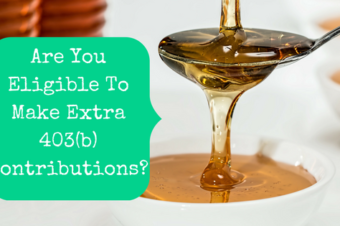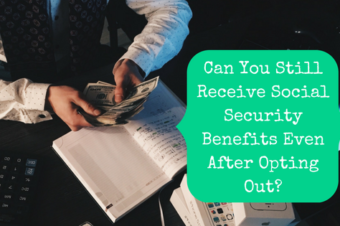
I recently received a message from a reader wondering what she should do with her extra income. Should she put the extra into retirement or towards paying off her house early? She was having a disagreement with a family member and wanted to hear my take on the issue. Well, here it is:
You Want Your Mortgage Paid Off
Having your mortgage paid off is a wise and sensible goal. However, there are many people, even financial professionals, who will say just the opposite. This is why I think I’m right:
It Isn’t Worth The Deduction
You’ve probably heard some people recommend that you keep a mortgage in order to get the mortgage interest tax deduction. They grab at tax deductions like children fighting for a pinata’s candy without even thinking through the math behind it.
A tax deduction reduces your taxable income. If you pay $1,000 in mortgage interest, then you get to deduct that from your taxable income. If you pay 25% in taxes, that’s $250 that you save in taxes. That sounds great, doesn’t it?
Not really. In order to get those savings, you had to pay $1,000 in interest. If your mortgage is paid off, you won’t get the $250 tax deduction, but you’ll still end up $750 ahead by not paying interest in the first place.
It Reduces Your Risk
Dave Ramsey loves to tell people that 100% of homes in foreclosure had a mortgage. What he means to say is that if you have a mortgage, you run the risk of being foreclosed on. If you don’t owe a bank, they can’t take your home.
Even without a mortgage, you can put your home at risk. If you don’t pay your property taxes, the government will put a lien against your house. You will have to pay off the lien before you will be able to sell the home. Different states have different laws, but sometimes a lien holder has the power to force a sale so they can collect what’s owed to them.
Honestly, though, I’ve never seen a foreclosure caused by anything but a defaulted bank mortgage. Without a mortgage, your risk of losing your home is very low. For me, that’s enough of a reason to want my mortgage paid off.
It Makes Retirement Cheaper
If the standard mortgage payment is 28% of income, what happens when you don’t have a mortgage payment? That’s right, you need 28% less income! If you’re used to needing $50,000 a year to live off of, paying off your mortgage will reduce that to $36,000.
If you’re not retired yet, that’s an extra $14,000 a year that you can save for retirement without making any changes to your lifestyle. Awesome!
Not having a mortgage in retirement will make your savings stretch a lot further. Let’s say you have a $300,000 nest egg. Assuming it’s earning 4% and you don’t have to pay any taxes on the withdrawals (let’s hear it for the Roth IRA!), it will last you just under 7 years with annual expenses of $50,000. Now, if you have your mortgage paid off and only need $36,000 a year, that same nest egg will last you over 10 years. Getting rid of your mortgage just made your nest egg last almost 150% longer!
(If those numbers scare you, good. Savings of $300,000 isn’t as big as it sounds, especially if you don’t have Social Security.)
You Need More Than A House In Retirement
So you should put all your money into paying off your mortgage, right? No, not really. I said that paying off your mortgage is a great thing, but it may not be the best thing for you. Why not?
You need more than a house in retirement. How are you going to pay your other bills? Feed yourself? Feed your fluffy little white dog? More than a house, you will need money in retirement.
If you have a paid off mortgage but not enough money to sustain yourself in retirement, you will have to find a way to get money out of your house to live on. To do so, there are several options:
Sell Your Home And Downsize
The easiest thing to do that carries the least risk is to simply sell your home, buy something cheaper, and live off of the difference. Many people do this. You may need to downsize significantly, though, in order to not have to also employ one of the following options.
Get A Home Equity Line Of Credit
If you don’t need a whole lot of money, you can get a home equity line of credit (HELOC), where a bank lends you money with your home as collateral. In order to qualify, the bank will look at your debt-to-income ratio. As a retiree, you may have little to no income, which could disqualify you from a HELOC. Borrowing against your home with a HELOC will also increase your risk.
Get Another Mortgage
You can just take out a mortgage on your paid-off home, called a Cash Out Refinance. Of course, you would need to take out enough equity to cover your expenses and pay the monthly mortgage payments. You may also get tripped up with debt-to-income ratios, depending on your lender. And, in addition, you once again face the risk of foreclosure.
Get A Reverse Mortgage
Reverse mortgages were created for this very purpose. In fact, you have to be at least 62 just to be eligible for one. They work just the opposite of a traditional mortgage, hence the name. Instead of slowly paying the bank to gain equity, the bank slowly pays you and you lose equity.
One downside to reverse mortgages are their cost. They tend to have high fees and can cost as much as $20,000 more in fees than a traditional mortgage. Also, once you use up your equity, you’re out of a house and an income source. You have to move since the bank now owns your home. Reverse mortgages can backfire if you outlive your home’s equity.
The Answer
So, my answer to the original question is this: What you should do depends on how much money you have saved for retirement. If you have no cash set aside, forget the house and save for retirement! If you already have a healthy retirement fund, then go ahead and pay off your house.
Chances are, though, that you’re somewhere in between. In that case, you need to do some more detailed projections:
If you put the money towards your house, how soon will you have it paid off? And with it paid off, how long should your savings last you in retirement?
If you don’t pay off your house, but put the money towards retirement, how much will you be able to save by the time you retire and how long will it last you?
Remember, if you choose not to work towards paying off your house now, there’s no reason you couldn’t pay it off with some of your retirement savings once you retire.
No matter which route you take, you’re spending less than you earn and thinking of the future. You’re way ahead of most Americans. Good job! I’m proud of you!



![[Video] Q&A: Do Additional Principal Payments Qualify for the Housing Allowance?](https://pastorswallet.com/wp-content/uploads/2022/03/Copy-of-Do-Pastors-Really-Have-to-Pay-15.3-for-SECA-340x226.jpg)
3 Responses
Paul Sharp
December 14, 2017Paying on mortgage early is going to be the best option for you because you can convert this money into cash at anytime of need. In extreme cases, you can even use reverse mortgage loans to liquidate the value as well.
Jonathan
January 5, 2018How does the clergy housing allowance figure in? In your example, a $1000 mortgage interest deduction results in about $250 tax savings (federal). But that same $1000 in mortgage interest reduced taxable income because of the clergy housing allowance, meaning another $250 tax savings (federal). That’s a total of $500, and doesn’t even account for state tax savings. Not only that, but you weren’t just paying mortgage interest. Along with that, you made principal payments which not only reduce your taxable income, but also increase your equity. Paying off the mortgage early rarely makes sense, in my opinion. You should always fund your retirement first.
Amy
January 7, 2018Jonathan, you’re right that the clergy housing allowance provides even more tax savings. Since everyone’s situation is different, I didn’t do a detailed analysis but rather brought up some points that each person should consider as they review their own personal situation. Everyone has different priorities and needs, so they will answer the question differently. Thank you for reading and commenting!